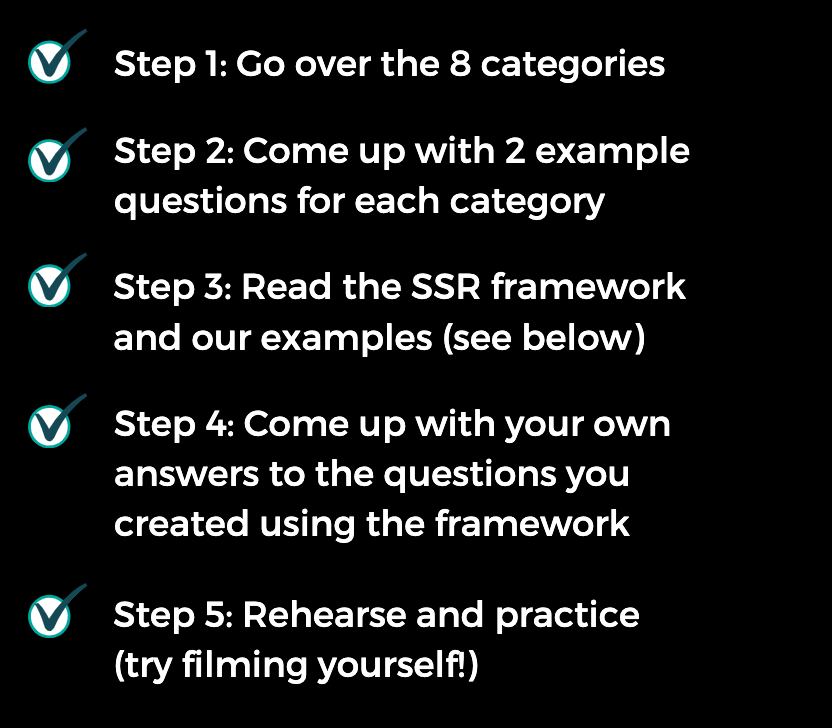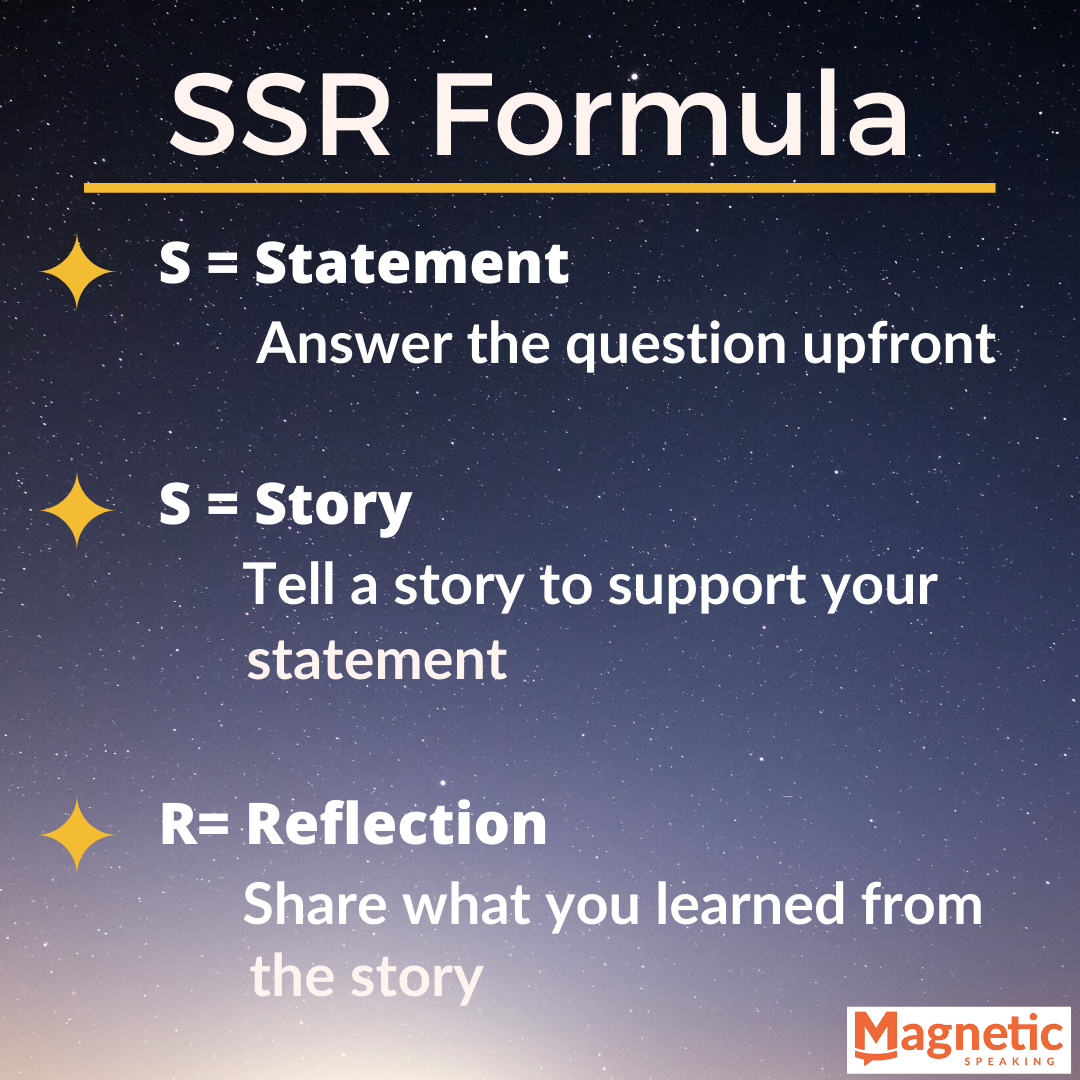Job interviews can be nerve-wracking! Especially when it’s a job you really want. One of the most challenging parts of an interview can be behavioral interview questions – you know..the ones that often start with “tell me about a time when…”
But have no fear! This article will help you handle them like a pro.
What is a Behavioral Interview Question?
A behavioral interview question is any question that assesses how you think, feel and act in a particular situation. The interviewer wants to look at your past behavior to see if you’re a good fit for the role, the team and the company culture.
How to Use This Article
There are tons of articles with practice questions that you can find online. This approach can still be helpful, but ultimately trying to memorize a bunch of potential questions and answers can be stressful and time-consuming! Our recommendation is to follow the steps below to set yourself up for success and come away with a framework that can help you no matter what you’re asked.

If you need help, reach out for some 1:1 interview coaching
8 Categories
Get familiar with these 8 categories when thinking about behavioral interview questions – We’ve seen that these categories are frequently brought up in interviews. Regardless of how the question might be phrased, below we dive in and explain what the interviewer is really looking for in each category.
1. Conflict / Disagreement
Conflict and disagreements are normal and healthy in a work setting if managed correctly. Your interviewer will be interested to see how you handle conflict. Their questions might be as general as “tell me a time you were in a conflict situation.” Or they can be more specific, like “tell me a time you disagreed with your boss.”
In the answer to this question, you want to show 3 things.
- You are comfortable with healthy conflict.
- You have a thoughtful and professional approach when handling conflict.
- You are rational and fair.
2. Time Management / Productivity
These will be questions around how you manage your workload under daily pressures as well as conflicting timelines.
Specifically, the interviewer will be searching to find out how you work on your own. Can you get through tasks quickly and effectively?
These would be questions like, “tell me about a time when you had a project deadline you had to hit, what you did and how you handled it” or “tell me about a time when you had competing deadlines and how you managed it.”
3. Initiative / Leadership
Behavioral questions on initiative and leadership are almost bound to come up for any role. Even if they don’t ask about it directly, you want to show how you’ve demonstrated these qualities in the past.
One aspect is showing how you’ve gone beyond your job role to do things outside of it.. Have you spun up new projects on your own? Have you taken on a part of a project that you didn’t have to because you knew it would help the team?
Another aspect is whether you’re proactive in anticipating and addressing problems – a huge part of leadership. Have you demonstrated that you look ahead and act accordingly? Bonus: Can you get others behind the plan as well?
4. Team Work / Collaboration
Teamwork and collaboration come down to whether you can work well with others. Do you incorporate colleagues’ ideas into your work? Are you open to feedback and others’ opinions?
To take it a step further, you can demonstrate situations where you’ve brought other folks into a project or sought their ideas out, which shows both initiative and team-work blended together.
A sibling category with collaboration is conflict. How did you handle differing opinions? Were you able to come to a consensus and move forward?
This is a category you can’t avoid, so be prepared with at least one good example here.
5. Managing Up / Managing Down
When managing, there’s bound to be issues that come up with your team. Have you been able to support your team well and look underneath the surface of what’s happening? Have you helped them prioritize and deal with issues?
Often, you’re not just managing down – you have to manage up as well. Maybe a director or VP was a part of your project and they technically had more rank than you. How did you manage their inputs and expectations? What about when they didn’t deliver on something they said they would?
6. Motivating Team / Motivating Self
Are you an energy sink or are you a powerhouse? Energy sinks steal energy from everything around them; powerhouses provide energy to themselves and everyone around them.
When the interviewer is asking questions around motivation, they are trying to find if you are a sink who will come in and bring the whole team down or a powerhouse that will lift everyone up.
Behavioral questions in this category can be in the form of “tell me about a time you had to give bad news to your team?” or “tell me about a time when team morale was low.”
When answering these questions, make sure you focus your answers to show that you have a pulse on team morale and that you have specific strategies to lift your own morale and the team’s.
7. Learning Speed / Adaptability
Behavioral questions on learning and adaptability are applicable when you’re transferring to a new project, job, industry, space, product line or anything else that would cause you to have to pivot unexpectedly or pick up something new quickly.
This is important to the interviewer because people don’t work in their own capsules. More often than not, it will be a team effort to get the job done and that may require flexibility. Flexibility in terms of your ability to move from project to project unexpectedly or handle obstacles that come up.
8. Mistakes / Failures
These will be questions around mistakes or failure that you’ve been through in the past and how you overcame or handled them.
One example could be, “when was a time you failed to hit a deadline and how did you handle it?”
Mistakes and failure are inevitable. And it’s okay because we’re all human so we all make them. But what the interviewer is looking for is HOW you handled them. Did you give up? Did you lose motivation? Did you LEARN from your mistakes?
What you want to focus on here is showing that you’re comfortable admitting you made a mistake and most importantly, that you learned from it.
SSR Framework
The last thing you want to do when answering behavioral interview questions is to ramble on and on. One way to help you stay focused is and succinct it to construct your answer using the SSR formula.

When asked a behavioral question, construct your answer using the formula and you’ll be on point. Below you’ll find examples of answers for three common behavioral questions using the formula.
SSR ex #1: Behavioral Questions on Initiative / Leadership
A common question you might get with initiative/leadership could be quite direct: “Tell me about a time you took initiative.”
In my last role, I ended up changing the product roadmap of our team from my own research (Statement).
I felt that our user research team was focused too heavily on feature research and had breezed past product/market fit too quickly. I started doing my own customer surveys and testing and found that it wasn’t the features that were an issue – we actually weren’t solving a deeper need for the market we were addressing. I ended up presenting this research to my manager and eventually the product team. They ended up stepping back to find better product/market fit before throwing more money and time into development (Story).
From that experience, I’ve learned to not just take the assumptions of the team I’m on, but to question them and make sure that we’ve all thought it through (Reflection).
A response like this would demonstrate initiative and self-reflection as well. That’s the whole purpose of this framework!
SSR ex #2: Behavioral questions on Learning Speed / Adaptability
A common question you might get from this category could be: “Tell me about a time you were working on a project but got switched to another assignment.”
This happened all the time when I was doing recruiting. I’d be working on recruiting for one role and then the job would get filled or we’d get feedback from the client saying they’re not looking for this anymore (Statement).
I was once working on recruiting a Java developer. It’s a difficult role to recruit for and after a few days, I discovered that the role got filled quickly. So after several days of work, I had to switch to start recruiting for a C# developer abruptly. Thankfully, during my time recruiting a Java developer I came across a C# developer and made sure to keep in touch because I knew a situation like this may happen. It did happen, me getting moved off a role, and because I proactively set myself up for this, I was able to come through quickly with the C# developer to get him the job (Story).
What I learned from this, is that I need to be sure I’m always planning ahead. No matter the role I worked on, I had to be prepared for obstacles (Reflection).
SSR ex #3: behavioral questions on Conflict / Disagreement
A typical example for this one is “tell me about a time you disagreed with your boss?”
Answer using the SSR formula might look like this:
Yes, I remember a time when I disagreed with my manager about an experiment that I wanted to run (Statement).
While working as an engineer, I was working on optimizing a chemical reaction. I suggested to my manager that the reaction follows Le Chatelier’s Principle and if we add a piece of equipment that extracts the water as it’s produced as a byproduct of the reaction, we can speed up the reaction. My manager told me that this will not work for the project I was working on (Story).
So I didn’t argue with the manager and I worked on my own time to construct the experiment. I ran it over the weekend and when finally got the results I found that my manager was right all along. On Monday I went to my manager’s office and I confessed that I ran the experiment over the weekend on my own time. I also told him that he was right. You should have seen the grin on his face.
I learned that when you disagree with your manager, arguing about it doesn’t help. It’s best to get some data to share with your manager (even if the data does not support your thesis) because that will prove to your manager that you’re fair (Reflection).
Conclusion
By learning this framework and familiarizing yourself with the 8 categories listed above for addressing behavioral interview questions, you can set yourself up for success and limit the stress that comes from the typical approach to interview prep. If you’d like more support to prepare for an upcoming interview, reach out to learn more about 1:1 coaching.




